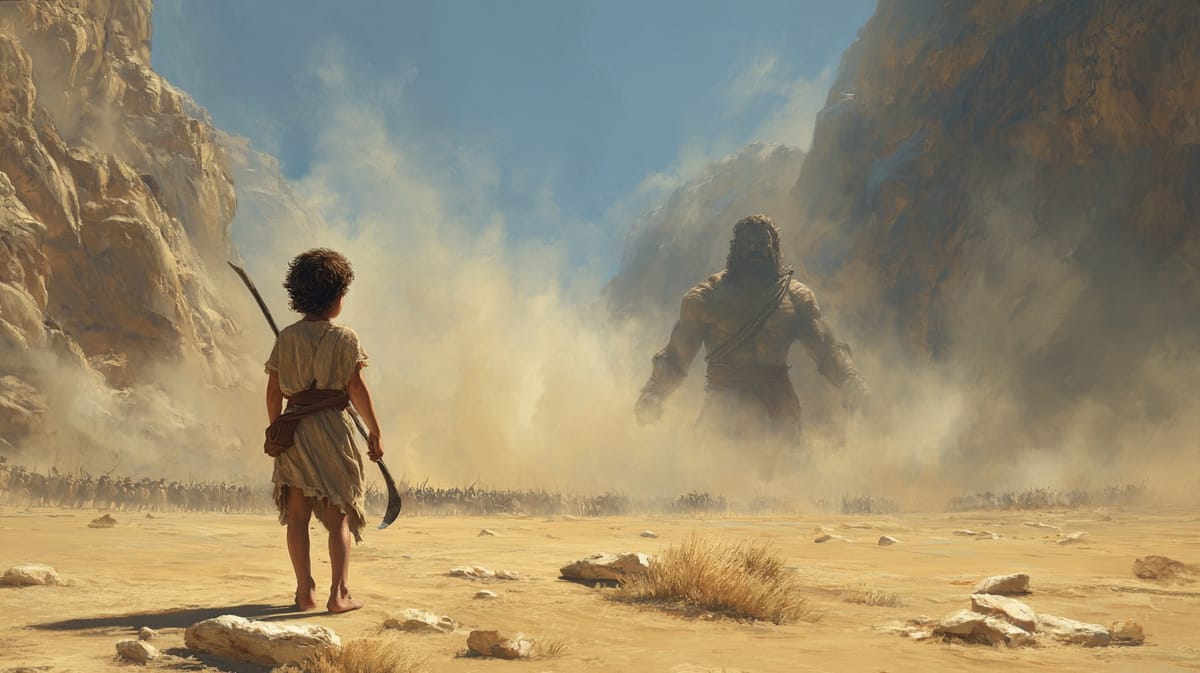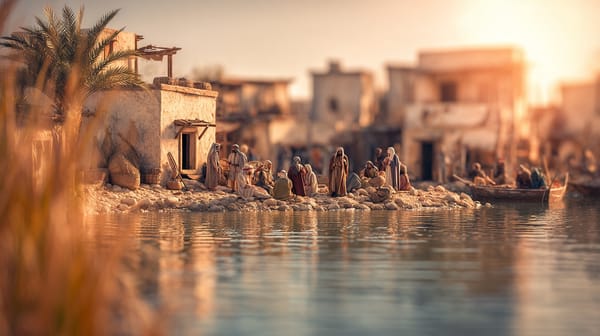Fairhaven Sermon 9-7-2025

In this week’s service, Rev. Peg Bowman explored the familiar story of David and Goliath, highlighting the surprising context surrounding this iconic tale. She emphasized that David, the future king and prolific psalmist, wasn's a celebrated figure at the time; he was the youngest of eight sons, overlooked in Jesse's family due to their cultural norms. Working as a shepherd, David spent his days in solitude, tending to sheep, playing the harp, and developing a deep connection with God, a stark contrast to the troubled King Saul, who was suffering from what might have been PTSD or bipolar episodes and needed musical solace. This background laid the foundation for David's courage when he confronted Goliath, a giant taunting the Israelite army and insulting the living God.
Bowman underscored that David's victory wasn't just a "rags to riches" story, but a testament to what God can achieve through a person wholly committed to Him. Despite his humble beginnings and lack of formal education, David's time spent in quiet communion with God prepared him to face seemingly insurmountable challenges. Ultimately, the sermon encouraged the congregation to emulate David's faith and courage, recognizing that even imperfect individuals can be instruments of God's purpose and that no experience, however small, is ever truly wasted when offered to Him.
Transcript
So this morning, as you heard, we're continuing our series with the Bible stories from childhood. And today we have that story of David and Goliath. This is a story of unforgettable courage and And it's just the beginning of a story of a man who literally became world famous. David's story is told in the Bible, in the Torah, and in the Koran, the holy books of three major religions.
David's name is known by more people today than it was back then. But on the day that this battle took place, David wasn't famous yet. In fact, he was anything but famous. David had been secretly anointed by the prophet Samuel to be the next king, but nobody knew that yet, apart from David's immediate family.
Nobody knew yet that David would become the most famous king Israel ever had. Nobody knew yet that David would write some of the most moving worship songs ever written. And certainly nobody knew yet that one day there would be a Messiah who would be called the son of David. At this point in time, David was just the youngest son of the eight sons of Jesse of Bethlehem.
Bethlehem in Hebrew, Beit Lechem, which means the house of bread. This city would also one day be the birthplace of the bread of life, Jesus. But back then, Bethlehem was just a small town. And as in so many ancient cultures, in Jesse's family, the oldest son was considered the most important.
The oldest son received the larger inheritance. It was his job to take care of the family after the patriarch passed and Being the youngest son like David was, it didn't get a person very far in that culture. David's three oldest brothers were at that time serving in the military. They were fighting the Philistines while David was back home in Bethlehem taking care of the sheep.
So David was outdoors most of the time, sleeping under the stars, getting to know each sheep by name, helping the ewe lambs give birth, protecting the sheep from predators, and most of the time it was pretty quiet. It gave David the chance to pray, to get to know God well. It also gave David the time to practice the harp and learn it well. And the fields where he sat around a thousand years later would be the same fields where shepherds would hear angels singing about the birth of the Messiah.
David never heard any angels singing in that spot, but he did experience God's presence and God's power, especially when he used his slingshot to kill bears and lions who attack the sheep. The life experiences of a shepherd helped to shape this young man into the kind of leader that would make a good king. Ironically, back in those days, shepherds were not all that welcome in polite society. Apart from the fact that David was the youngest son, which put him behind the eight bowl to start with, People had, back then, had mixed feelings about shepherds.
They admired shepherds for the hard work they did, but they also felt that shepherds were socially awkward because they spent so much time alone. And besides that, shepherds smelled very strongly of sheep, right? And considering that back then nobody used deodorants, that was a pretty bad smell. So on the other hand, in David's case, David was already starting to build a reputation for himself. So.
.. Shortly before our story took place, David had been introduced to King Saul. And the reason was that Saul was a deeply troubled man.
And nobody knows the exact nature of Saul's difficulty, but he was in trouble both mentally and emotionally. And that trouble started after Saul had disobeyed a command from God, which was given to him by the prophet Samuel, at which time God removed protection from Saul. Now, what exactly that meant and what exactly happened, we don't know, but we don't know. He may have been suffering from PTSD.
He may have had anxiety or bipolar episodes. We just don't know exactly what was troubling Saul. All we know for sure is that these episodes of anxiety interfered with Saul's ability to lead and be an effective king. So the king's servants suggested to Saul that he bring in a gifted musician to lift his spirits.
And they found David, who played the harp very, very well. And so whenever David played, King Saul's spirits were lifted and he was able to rule as a king. But the effect would only last for a little while. So David was a fairly frequent visitor to King Saul.
The rest of the time when David was not playing for King Saul, he was home watching the sheep. And I imagine he liked the job, I imagine he enjoyed having time to talk to God, practice his harp, giving names to all the little sheep, all that kind of stuff. And every now and then his father Jesse would say to David, Take some supplies to your brothers on the front lines. The armies back in those days were not fed by the government, they were fed by supplies from home.
And so David would load up breads and cheeses and whatever else was on hand, take them to his brothers, they said three of whom were in Saul's service, and he also brought food to their commanding officer to share with the men. So the day that David met Goliath was one of those days when he was bringing food to his brothers. David was in the camp when Goliath the giant came out from the opposing Philistine army, and he said, among other things, 'I defy the ranks of Israel. Give me a man that we might fight together.
The victor will make his nation victorious, and the other nation will surrender.' And Goliath said other things too, things that made fun of Israel's army and made fun of Israel's God. And this had gone on for 40 days before David's visit. Now, a little background on Goliath.
Okay, first, historians say, believe that Goliath was a true giant. How exactly how big he was is debated. But a giant in the scientific sense, as they say, a hereditary pituitary disorder causing familiar gigantism. In other words, it ran in his family.
It has been documented that Goliath also had a brother and three sons who were also giants. Now exactly, like I said, exactly how big is debated. Big enough is the important thing, right? And whenever Goliath made his challenge, Israel ran for the hills. No one had the courage to stand up to Goliath.
So David heard the men of Israel talking amongst themselves and they were saying, the king will give great riches to the man who kills this giant. He will give the man his daughter in marriage and he will make his family free in Israel. In other words, they would never have to pay taxes again. Can you imagine that? No taxes.
So David asked a few of the men if this was actually the case. Was this, it sounded too good to be true? And the men answered, yeah, this is the truth. This is what the king will do. And David's older brother Eliab overheard these conversations, and he got ticked off at David.
He said to David, why are you here? Who's taking care of those sheep of yours in the wilderness? You have evil in your heart, and you're only here to watch the battle. And David's reaction hints that this was not the first time the two of them had had words. David answered, What have I done now? It was only a question, he says. And having heard the whole story, David was mightily ticked off that this uncircumcised Philistine, as he called Goliath, had been getting away with ridiculing God's people and God's army.
So David goes to King Saul and says, let no one's heart fail because of him. Your servant will go and fight with this Philistine. And Saul objects, how could a teenager like David, who has never held a weapon of war, take on this huge man who's so well trained in battle? But David already had it worked out in his mind. He says to Saul, Your servant keeps sheep for his father.
And he tells him about killing lions and killing bears and rescuing sheep out of the mouths of these animals. David says, this uncircumcised Philistine shall be just like one of them. He has defied the armies of the living God. See, David's offended because this Philistine is insulting the one true and living God, and David is not having it.
Now David, of course, is not your perfect hero. He does make mistakes, sometimes really big ones. But the one thing we can say about David is that he loves God. He loves God with everything he is and everything he has.
David's whole heart is in God's hands. And we can hear this in the Psalms that David wrote, The Lord is my shepherd. I shall want for nothing, he says. And God says that David is a man after God's own heart.
And we see this in spades as David offers to defend God's honor with his own life. But this makes Saul uneasy. And Saul tries to talk David out of it. And David reassures him.
And then Saul offers David his armor and David tries it on, but he can't walk in it. So he takes it off. And David instead takes his shepherd's staff and his sling, and it says, Five smooth stones from the wadi, a wadi being a river that is dry part of the year and wet part of the year. And so he would have found in that riverbed some nice smooth stones that would serve his purpose.
And armed only with these things, David approaches the giant. Now Goliath looked at David, all young and handsome, and Goliath hated him. And Goliath cursed David and gave him an earful of trash talk. But David was not intimidated, and he came back at Goliath with the ultimate trash talk, David said, And then all it took was just one stone guided by God's hand.
That stone went straight to Goliath's forehead. The giant fell face down and then David grabbed Goliath's own sword and cut off his head. And that sword was David's from that point on. When the Philistines saw this, they ran, and Israel chased them all the way to Gath, which was Goliath's hometown, and the Israels plundered their camp.
David, meanwhile, picked up Goliath's head, totally gross, and brought it to Jerusalem, and Abner, the commander of the army, brought David to King Saul, while David is still carrying his head around, and David kept Goliath's armor. At the end of the story, the author of Samuel writes, When David had finished speaking to Saul, the soul of Jonathan, Saul's son, was bound to the soul of David, and Jonathan loved him as his own soul. And thus begins one of the most famous friendships in history between Prince Jonathan and the shepherd David. David also married Saul's daughter, Michael, became the son-in-law to the king.
And one would expect this story to end and they all lived happily ever after. But that's not how things turned out. Saul's troubled episodes would become worse, and eventually David would have to run for his life. Somewhere around 15 years later, Saul and Jonathan would die in battle.
But those are stories for another day. For today, we want to look at David and Goliath. Because this story has been called a rags-to-riches story, or a victory for the little guy's story. I'm not sure I see it that way.
David was called and gifted by God from a very young age. And I think David's story is an example of what God can do when a person is fully committed to God, a person who loves God with all of his or her heart. God can call anyone and does call anyone into God's service. God can prepare anyone.
The most important thing is willingness to say yes and then to take it one step further to use the best that God has given us in service to God. So when we look at David, we have no idea what his IQ was. We have no idea what kind of education he had, if any. We do know that David, when he was young, spent a lot of time surrounded by God's creation and singing praises to the Creator.
Bottom line, nothing God gives us is ever wasted. David's time on those hillsides, alone with the sheep, playing the harp and singing songs to God was not wasted. David's time when he wasn't famous and was known only by the members of his family was not wasted. And like David, whenever we face a giant, whether that giant be sickness or family troubles or financial issues, whatever they might be, the same God who provided for David will provide for us.
So remember David's question, Who is this uncircumcised Philistine that he should defy the armies of the living God? In the same way we can stand up with confidence in the name of God whenever God's people are in trouble. We are not all called to be heroes on the battlefield. In fact, most of us aren't called to be heroes. But we are called to be faithful.
and we are all called to be courageous, and we are all called to put everything we have on the line for God. And when imperfect people are faithful and courageous for God, good things happen, not just for us, but for all of God's people. Amen.



